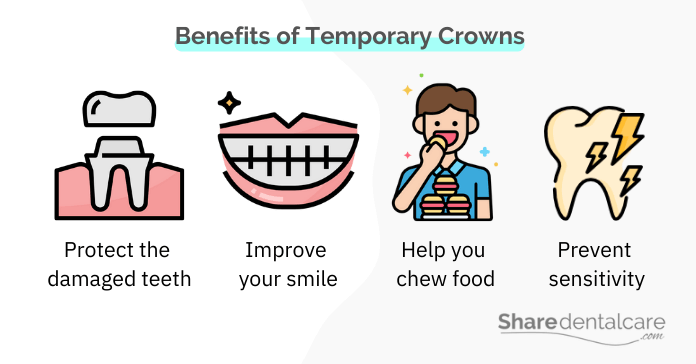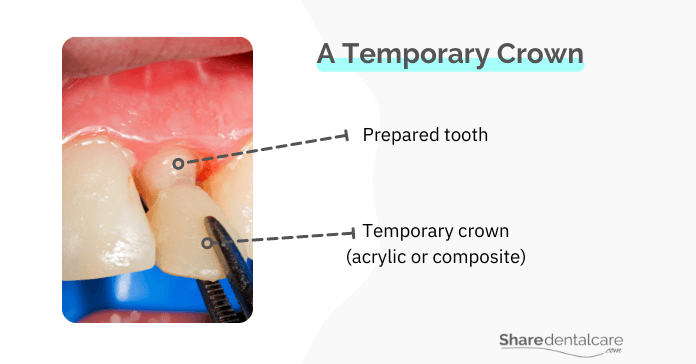If you have a broken or damaged tooth, your dentist will recommend a dental crown to restore the function and appearance of the tooth. First, your dentist will prepare the tooth to receive a crown and make an impression to send it to the dental lab. The making of a permanent crown usually takes one week or two. A temporary crown may be placed in the meantime to protect the tooth and help you chew food properly. In this blog post, we will talk about what you should do if your temporary crown broke off and how to prevent this from happening.
What’s a Temporary Crown & Why Do You Need It?
A temporary crown is a temporary restoration that protects the tooth until your permanent crown is placed. It is usually made of composite or acrylic resin material. Temporary crowns are not designed for long-term use. If your temporary crown broke off, you should call your dentist right away to schedule an appointment to replace it.
Uses & Benefits
The benefits of a temporary crown include:
- Protects the tooth from further damage until your permanent crown is ready.
- Helps you eat and chew food.
- Improves your appearance.
- Prevents pain or sensitivity if the prepared tooth is vital.
- Prevents the shifting of adjacent teeth.
If your temporary crown broke off, don’t panic and schedule an appointment with your dentist to prevent problems such as pain or teeth shifting. Learn more about the benefits of a temporary cap for a broken tooth.

Possible Causes: Why Did Your Temporary Crown Broke Off?
Temporary crowns are not durable because they are made of composite or acrylic resin materials. These materials are weak for crowns compared to metal, porcelain-fused-to-metal, and all-ceramic crowns. Your temporary crown may have broken off due to the following reasons:
- Biting on hard or crunchy foods: such as carrot sticks, nuts, popcorn kernel, chips, or hard candies. Hard foods could be the cause why your temporary crown broke off.
- Bruxism: teeth grinding or clenching can cause temporary crowns to break.
- Poor oral habits: biting or chewing hard objects such as a pen or ice cubes.
- Trauma: injuries in sports can cause crowns to dislodge or break.
- Improper fitting: If your temporary crown does not fit with the opposite tooth or is too high, it could break off when you bite.
- Long-term use: they should not be worn for a long time. Over time, temporary crowns wear out and eventually break off.
What Should You Do If Your Temporary Crown Broke Off?
If your temporary crown broke off, you should not panic. Your dentist can make a new one until the permanent crown is ready. Call your dentist right away to schedule an appointment to replace the broken crown. While you waiting for your dentist appointment:
- Brush and floss around the prepared tooth to remove food particles, plaque, and bacteria.
- Eat on the other side of your mouth.
- Avoid crunchy or hard foods.
- Don’t bite or chew hard objects such as pens or ice cubes.
- Use an over-the-counter pain reliever for sensitivity or pain.

What Happens If I Didn’t Replace The Broken Temporary Crown?
If your temporary crown broke off and you don’t schedule an appointment with your dentist, the following could happen:
- Tooth sensitivity or pain: if the prepared tooth is vital, the exposed tooth will cause sensitivity to hot or cold temperature and pain when eating certain foods.
- Tooth shifting: the adjacent teeth may move or shift to fill in the gap of your missing temporary crown. So, the permanent crown will not fit properly.
- Tooth damage: biting or chewing on the prepared tooth can weaken it and make it more prone to fracture.
- Tooth decay & Gum disease: food particles and plaque may accumulate around the prepared tooth and eventually cause tooth decay and gum disease.
Therefore, If your temporary crown broke off, make an appointment with your dentist right away to prevent these problems from happening.
Tips for Maintaining Prepared Teeth and Temporary Crowns
While you waiting for your permanent crown, there are some things you can do to help prevent your temporary crown break off:
- Brush and floss regularly: to remove food particles, plaque, and bacteria around the temporary crown.
- Use a night guard: if you have bruxism, use a nightguard to protect your teeth, temporary crown, and permanent crown.
- Avoid eating hard and crunchy foods: avoid eating hard foods because they can damage your prepared tooth and temporary crown.
- Avoid biting hard objects: such as pens, pencils, ice cubes, or small toys.
- Eat on the other side of your mouth: if you cannot avoid crunchy or hard foods, eat on the other side of your mouth. This way, you are less likely to bite down too hard on your temporary crown.
- Use a mouth guard: protect your teeth, temporary crowns, and permanent crowns in sports activities by using mouthguards during games.
- Don’t delay your dentist appointments: temporary crowns are not designed for long-term use. Get a permenant dental crown for your broken tooth as soon as possible to prevent complications.
Temporary Crown Broke Off – Conclusion
If your temporary crown broke off, don’t panic. It can be replaced with a new one by your dentist until the permanent crown is ready. Temporary crowns are not strong and can break off if you bite on hard foods and objects or have bruxism. So, you must avoid biting down too hard while eating and use a night guard during sleep if you have a habit of grinding or clenching your teeth. Call your dentist right away if the temporary crown breaks off and schedule an appointment to have it replaced.